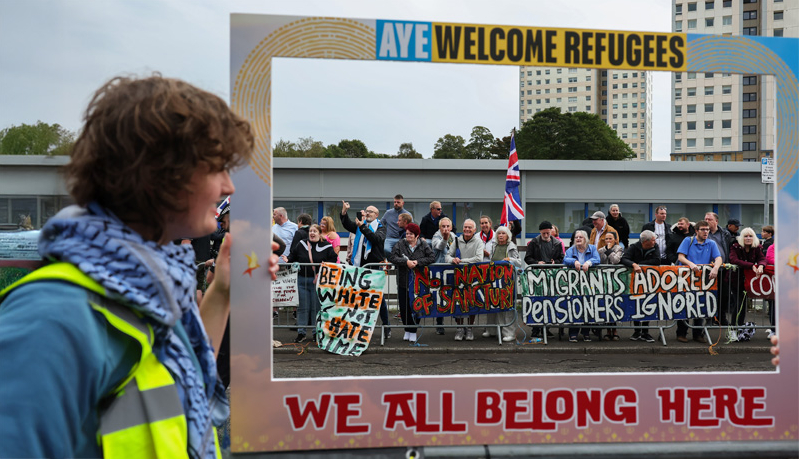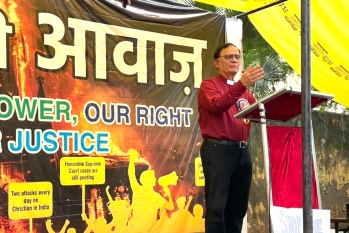
The unrest at asylum hotels in the UK and the rise of nationalism (even among Christians in the country) go far beyond politics. Across the country, protests have pushed migration back into the headlines, dominated mainly by anger, fear, with a touch of sensationalism.
Both in the European Union and the United States of America, there is a rise in anti-migration rhetoric and sentiments. Of course, there are many valid factors at play, and they expose deeper systemic failures: unsafe housing, slow asylum processes, under-resourced communities, and divisive political narratives.
Men, women, and children who happen to have fled violence, persecution, and hardship, and who deserve safety, dignity, and compassion.
But amid the shouting and violence, one truth risks being lost: the humanity that we all share, including those seeking refuge in our cities and countries. Like the rest of us, they are men, women, and children who happen to have fled violence, persecution, and hardship, and who deserve safety, dignity, and compassion.
For Christians, moments like these are not merely matters of public debate or policy—they ought to cause us to reconsider how we live faithfully at the intersection of national politics and our deeper calling to follow Christ as a pilgrim people, sojourners on the earth. How we speak about migration, how we respond to fear, and how we advocate for justice all reveal whether we are echoing society’s anxieties or embodying the heart of Christ.
Our words and actions are never neutral.
In such times and as always, our words and actions are never neutral; they are a witness to the gospel. They can either reinforce division and suspicion or nurture understanding, solidarity, and hope.
I remember Malawi in the 1980s. At that time, our neighbor Mozambique was torn apart by a brutal civil war that lasted for years. The violence forced hundreds of thousands of Mozambicans across the border into Malawi, desperate for safety. They arrived with little more than the clothes they were wearing—traumatized, hungry, and uncertain of what the future would hold.
And yet, I remember how our communities responded. Just like we saw back in 2022 when Russia invaded Ukraine and we saw an influx of Ukrainian refugees across Europe, ordinary Malawians, who themselves lived with limited resources, chose to open their homes, villages, and lives to welcome the Mozambican refugees.
Families shared food, however scarce. Schools made space for displaced children. Churches offered shelter, prayer, and encouragement. It was not without difficulty, but there was a deep recognition that these were not strangers—they were neighbors, fellow human beings whose survival was bound up with ours.
Ubuntu insists that our humanity is shared, and that to deny dignity to another is to diminish our own.
This spirit of hospitality was not rooted in wealth or comfort. Most Malawian families live close to poverty. (Many live below the poverty line.) Instead, it was grounded in the spirit of umunthu—that profound African conviction that “I am because we are.” Often known as ubuntu, it insists that our humanity is shared, and that to deny dignity to another is to diminish our own.
In welcoming the Mozambican refugees, Malawians were not just showing kindness; they were affirming their own humanity, living out the truth that the well-being of one is tied to the well-being of all.
This is a lesson our world urgently needs today. Migration dominates headlines across the globe, often framed through fear, suspicion, and hostility. In countries like the UK, asylum seekers are regularly portrayed as a burden or even a threat, their humanity overshadowed by political arguments about borders, costs, and control. Yet, the reality is this: the vast majority of the world’s refugees are not in wealthy nations but in poorer countries, often neighboring the places of conflict.
Uganda, for example, hosts more than 1.5 million refugees; Pakistan and Iran have sheltered millions from Afghanistan; Lebanon, Jordan, and Turkey carry the enormous weight of welcoming those fleeing Syria. These are not nations of abundance, but nations whose people—like Malawians in the 1980s—live out a form of sacrificial hospitality rooted in recognizing our shared humanity.
If those with the least are able to carry the greatest weight, how much more should those with greater resources embrace the call to hospitality?
This reality should give Christians in wealthier nations pause. If those with the least are able to carry the greatest weight, how much more should those with greater resources embrace the call to hospitality? The gospel reminds us that our identity is not secured by exclusion but by love, not by defending ourselves against others but by recognizing Christ in the face of the stranger.
For Christians, this call is deeply biblical. Abraham welcomed strangers at his tent. Israel was commanded to remember its own history as migrants and to care for the foreigner. Jesus himself began life as a refugee, fleeing violence in search of safety in Egypt. The church is called to embody this same spirit of hospitality—not out of surplus, but out of faithfulness.
To speak of ubuntu in this context is to say that hospitality is not merely an act of generosity toward others. It is about the humanity of all of us. When we welcome the stranger, we strengthen the bonds that make us human. When we turn people away, we wound not only them but ourselves. True hospitality costs something—but it also reveals who we are and what kind of society we wish to be.
But ubuntu also challenges us to go deeper than welcome. It calls us to ask why people are displaced in the first place. And here we must be honest: many Western governments, including the UK and the US, continue to profit from the global arms trade and economic exploitation of other parts of the world.
Weapons manufactured and sold in the West fuel conflicts in Africa, the Middle East, and beyond—conflicts that destroy communities and force families to flee. It may be plausible that the tariffs will deepen the chasm between the West and poorer countries in Latin America, Africa, and Asia.
To practice ubuntu-shaped hospitality is, therefore, to advocate for peace.
It is not enough to welcome refugees at our borders if our economies simultaneously profit from the conditions that drive them out of their homes. Christian witness demands that we not only open our doors but also raise our voices against policies and practices that perpetuate any form of violence (military, economic, or otherwise). To practice ubuntu-shaped hospitality is, therefore, to advocate for peace, to call governments to account, and to insist that compassion must be matched by justice at every level.
The memory of Malawi’s response to the Mozambican refugees continues to shape me. It reminds me that hospitality is not optional; it is central to our humanity and our faith. It also challenges the narratives of fear that so easily dominate public conversation. Migration is not first a political issue—it is a profoundly human reality, and how we respond is a test of both our compassion and our courage.
The poorest nations shoulder the greatest responsibility.
In a world where the poorest nations shoulder the greatest responsibility, perhaps the church in wealthier countries is being called to recover the sacrificial hospitality of ubuntu. Not as a policy slogan or a temporary gesture, but as a way of life that affirms: “I am because we are.”
How Christians can embody hospitality today
- Open your doors. Befriend asylum seekers and refugees in your community. Hospitality can be as simple as sharing a meal, listening to their stories, or offering practical help.
- Speak truth with compassion. Challenge fear-driven narratives in your churches, workplaces, and social circles. Remind others that asylum seekers are people first—bearers of the image of God.
- Stand for justice. Advocate for fair asylum processes, safe housing, and policies that uphold dignity. Silence in the face of injustice reinforces exclusion.
- Practice solidarity. Join or support local organizations already walking alongside asylum seekers. Collective action strengthens witness and demonstrates that love is stronger than fear.
- Confront root causes. Call on Western governments to stop fueling conflicts through the sale of weapons. Advocate for peace-building and international cooperation that prioritizes human flourishing over profit.
The church can model a bigger imagination.
Rather than being trapped in the false choice between “helping locals” or “helping migrants,” the church can model a bigger imagination. We can work for policies that ensure asylum seekers are treated with dignity and that disadvantaged local communities receive the resources they need—better housing, investment in public services, access to decent jobs, and fair wages.
We can show through word and deed that God’s kingdom is not a zero-sum game. Extending hospitality to the stranger does not mean neglecting those already here.
Ultimately, to remember those who feel disadvantaged by migration is not to reduce our commitment to hospitality, but to deepen it. True hospitality seeks the flourishing of all—the asylum seeker, the long-term resident, the neighbor who feels overlooked. It refuses to let fear or resentment divide us. It insists that God’s love is big enough to hold every person in the community, and it works tirelessly to embody that love in action.
This is an opportunity to lead with faith, to counter fear with compassion, and to demonstrate a gospel-shaped response that values human dignity above rhetoric and embraces hospitality above hostility. To speak as Christians is to affirm human dignity, reject fear, embrace hospitality, challenge falsehoods, tell stories of hope, and call for justice.
Above all, it is to point to Jesus himself—the migrant child who fled to Egypt, the teacher who welcomed outsiders, the Savior who broke down dividing walls to create one new humanity (Ephesians 2:14–16).
Let us be persistent in praying for peace.
Originally published on Harvey's Substack, Global Witness Globally Reimagined. Republished with permission.
Dr Harvey Kwiyani is a Malawian missiologist and theologian who has lived, worked and studied in Europe and North America for the past 20 years. He has researched African Christianity and African theology for his PhD, and taught African theology at Liverpool Hope University. Harvey is also founder and executive director of Missio Africanus, a mission organization established in 2014 as a learning community focused on releasing the missional potential of African and other minority ethnic Christians living in the UK. More recently he became African Christianity Programme Lead for CMS (UK) Pioneer Mission Training and in August 2025 his book Decolonizing Mission was published.






